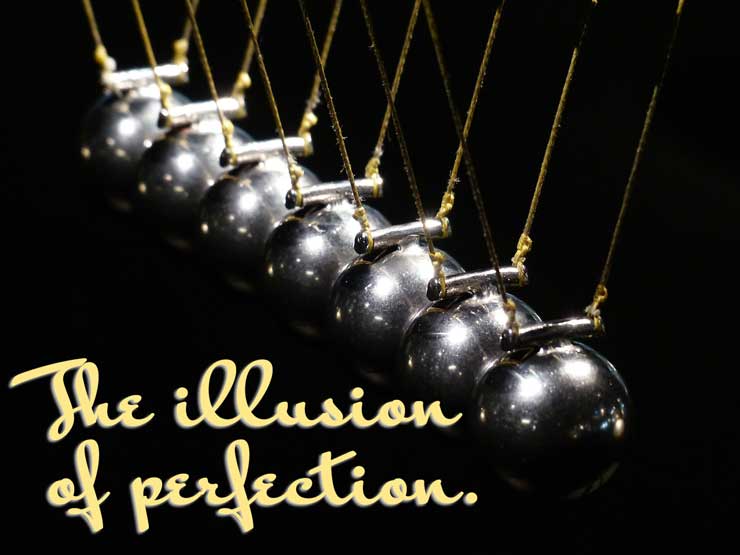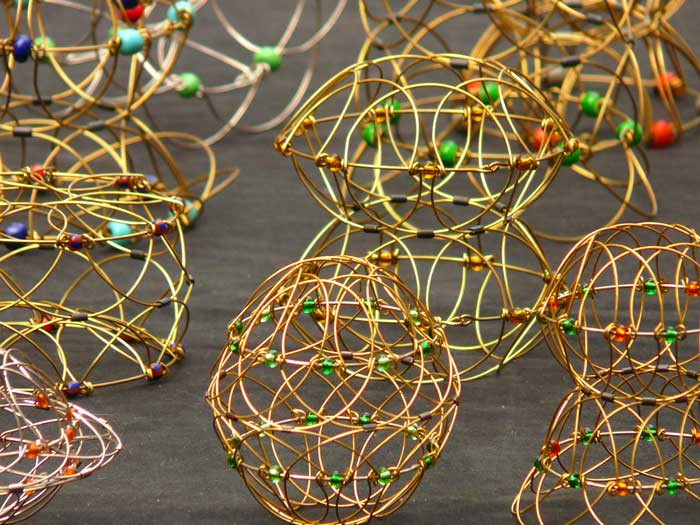Perfection is a trap. Is it holding you hostage too?
Perfection is the state of being perfect, and this state does not exist. (You knew that, right? Apparently, some of us perfectionists were left off the memo!)
Perfection is a moving target, forever deluding those of us silly enough to chase it. You can’t ever catch it, my dear, much like chasing a rainbow, or your shadow, or a fleeting thought.
It is impossible to capture the state of perfection – or perfectionism – and to be one with it.
So if you seek and praise perfectionism, it is ruining your life. Quietly and slowly but surely doing a number on it.
How do you tell if you are a perfectionist?
Easy. You are more obsessed with making something “better” than you are with looking at what you have and seeing it for all the good that it is. Your laser sharp focus is on the minuscule details of what’s not “right”, what’s “not working” and you focus all your attention and energy on those tiny details, whilst opportunity and happiness come and go, unbeknownst to you for you are far too busy with the pursuit of perfectionism.

It’s not your fault. They romanticized perfection!
As children, we grow up to desire it and associate it with something good and worthy of pursuit because grown-ups, teachers, parents, guardians, leaders all seem so fascinated by it, and as a society, we praise it, we use the words perfect, perfection, and perfectionist in a positive admiring tone.
Some of us grow out of it, and grow wiser as we grow older. If you escaped perfectionism, stay that way. You’re in the minority. Most of us learned to love the endless pursuit perfection in every aspect of our lives and what’s worse. We’re proud of it too.
Why? I believe we do it for two reasons. Or two assumptions rather, because they’re both false.
Assumption #1: We seek and praise perfection out of utter ignorance.
We don’t know the damage of perfectionism far outweighs any benefits we can hope to get out of it.
We think only of how nice, how wonderful, how worthy of celebration it would be if our bodies, our children, our careers, our relationships and our homes were perfect. Oh So Perfect!
Most of us don’t even know what this state of perfection looks like. We know only what it does not or should not look like, so we focus on that.
Here’s a sample inner dialogue inside the mind of a woman obsessed with achieving perfection for her body:
I’m not perfect. Frankly, I couldn’t describe perfect if my life depended on it but that’s not the point. I know this much:
I should be thinner.
I should be taller.
I should be more fair.
I should be less round.
I should eat less.
I should exercise more.
I should wake up earlier.
I should work harder.
I should do more yoga.
I should take up running.
I should, I should, I should …
If this inner dialogue sounds familiar, know this for now: You ARE perfect just as you are, but you can still get better for reasons that are important to you. Know those reasons first! Know yourself first.
Reminder: You can still grab The Positive Affirmations for Life program with more than 4 hours of audio affirmations for 7 life situations that impact your happiness and success the most.
Assumption #2: We seek and praise perfection out of confusion.
We confuse perfection with the state of quality. Your stuff is either perfect or poor quality. The “right” choice between those two flawed options is obvious. Is it not?
You choose perfection. Who wants poor quality in anything in life?
But perfection is far from high quality and in fact, the pursuit of perfection can lower the quality of your work and your results.
Perfectionism means it drives you nuts to see a little hair out of place, a little dust on your table, a little digital smudge on your picture, a little food on your child’s clothes, a little something that then takes away the entire focus on what’s right and what’s good and puts all attention on the minuscule details that nobody but you cares about.
Perfection means you simply cannot be content with what is.
Whereas high quality means you have done a good job, you have served the higher purpose, you have been useful and helpful and resourceful, you have put in your best efforts, and you have met the bar and even exceeded it without obsessing about small tiny details.
Seek High Quality. Not perfection.
8 ways perfectionism is ruining your life (most likely without your consent!)
With every act of perfectionism you commit, you’re slowly killing your opportunities, your chances for success and advancement, your possibilities for happiness. And no, I am not exaggerating.
That’s right. Perfection is ruining your life.
Start by learning these 8 ways perfectionism is ruining your life without your knowledge and consent.
1. You never get started.
The “someday” syndrome plagues perfectionists. You think too much about your dream – your dream book, your dream house, your dream car or family or dog – so much that you never quite get started. You never take that first step because what if it’s not the perfect first step?
You sit on these dreams and ideas for months and years, letting fear of imperfection decide the course of your life. Whatever it is, start it today and if it’s awful, I promise, you can just as easily quit!
2. You’re not able to mark anything complete.
Sure you may turn in your work and publish your blog post and send that assignment off to your teacher, but you never release it from your windmills of your mind. You never quite mark it complete and done and over with. You go back to it and think up ways you could improve it or even re-do the whole thing.
You carry these what-if thoughts with you and as the accomplishments of your life pile up, instead of celebrating, you carry only the question of what you could have done better.

3. You never ship it.
As Seth Godin teaches us, you have got to ship it – the product, the book, the assignment. Countless books end up in half-written manuscripts collecting dust, instead of on book shelves, spreading ideas. Thousands of businesses never take off because the owners are afraid of failure.
This applies to careerists and entrepreneurs alike. If you set out to do a piece of work, you have two choices: You can choose to ‘perfect’ it to the end of time and therefore robbing your clients and customers from the help and joy and relief it can bring them. Or you can ship it when it meets high standards of quality sans the obsession over details.
4. You ruin your creativity and curiosity.
Sure, perfection is a great reason to be efficient and get things done and move forward on a task, and constantly refine it to make it better, but in that rigorous process, you kill your creative genius and your curiosity juices. What if you allowed in a little spontaneity instead? Tried a new way?
My husband likes to take a new route home every time we go out. It drives me and his mother crazy. It makes him giddy and curious. I’ve learned to love it. What if you take a new route next time you have to write a book or create a product or give a speech?
What if you let go of perfectionism and tap into your curiosity and creative genius?
5. You limit your opportunities. Severely.
This one I believe wholeheartedly because it has happened to me. My obsession with small details has made me blind to huge opportunities in front of me. When you’re not seeing the big picture, you lose focus on what matters. Small details can be important, yes, but focus only on the ones that matter.
Most perfectionist tendencies are around the small stuff that only we notice, and yet they take up time and energy and in the process, we lose out on bigger opportunities. If you’re taking 10 years to write your first book only to discover that you were really meant to write your next book, well, is that time well spent? You be the judge.
6. You are not fun to be around.
Let’s face it. Nobody likes to be around people who are obsessed with the idea of making something perfect. It may be fun to watch a master perfecting his art, but it’s not fun to be your co-worker waiting on your stuff, or your boss or your spouse or friend when you are chasing the illusion of perfection in whatever areas of your life it may be.
You are too serious, too detached, and too involved and your loved ones cannot relate or understand. So you create unnecessary distance.
Perfection takes you out of the present moment and steals your time. Make sure you give it full consent to do that.
7. You never experience the joy of accomplishment.
One of the highest rewards of doing our work and going through our lives is that we feel the sense of completion, the joy of accomplishing something – anything. And we can celebrate and bask in the feeling.
When you are a perfectionist, you sabotage your feelings of accomplishment with worry and second-guessing and passing judgement on what you have done especially if you are not happy with the results.
Ask yourself then what’s the point? If you cannot enjoy the fruits of your labor, then why do it? When you withhold this joy, it kills your enthusiasm for next opportunities awaiting you and the cycle repeats.
8. You’re never happy. Or at peace
You’re constantly second and third guessing everything from your appearance to your choice of words, from your cooking and art to your coding and scripting, from your writing to your exercise routine, you are never ever completely happy with yourself. Or your level of skills and talents just as they are.
You never experience joy and happiness in the moment. You sabotage yourself with the pursuit of perfectionism and it’s impossible to be happy and at peace for any length of time when you are so far removed from what really matters.
Good news: Perfection plagues smart people. And smart people solve their problems.
Funny how perfection plagues some super smart people out there. Scientists. Doctors. Post-doctorates. Best-selling authors. Venture capitalists. Accomplished tech geeks. Don’t ask me how I know! Let’s just focus on you.
Chances are you are smart and a go-getter. Now that you know perfectionism is damaging your chances for happiness and success and even ruining your life if you continue to ignore it, take a stand. Make a decision to do something about it.
This is self-abuse and self-sabotage, and smart people like you and I take action to reverse and eventually stop bad behavior. It’s not our challenge that define us, but our actions. Let our actions speak then.
I’ve been plagued with perfectionism a lot in my life. I joke that I am a recovering perfectionist, and one person especially gets it. My great friend and scientist and writer, Jen Gresham is a master overachiever and intimately familiar with the downsides of perfectionism. You’ve got to watch this video below she created on the cure of perfectionism:
A few months ago, she developed a course for overachievers and perfectionists and while I haven’t taken this course, I know Jen and the high quality of her work and her first hand experience with perfectionism. She can help you find a cure to this dis-ease and experience true success in your life. Check out her course, The Overachiever’s Guide to Success!
FYI: I’m not affiliated with this product and receive nothing if you sign up for it except the gratification that you, my dear reader, are doing something for yourself to cure this dis-ease that is perfectionism and I applaud you for it.

 I am Farnoosh, the founder of Prolific Living. So glad you are here. My mission is to empower you to unblock your creative genius to live your dream life.
I am Farnoosh, the founder of Prolific Living. So glad you are here. My mission is to empower you to unblock your creative genius to live your dream life.